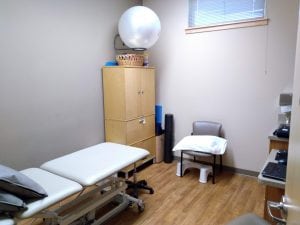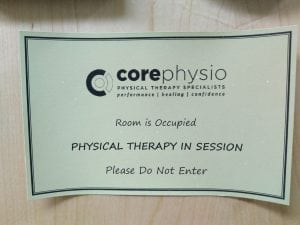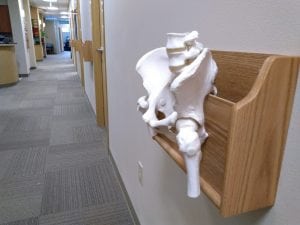Pelvic health problems impact one’s most private functions and relationships. To make matters worse, in many areas of the United States, finding a physical therapist with pelvic health expertise requires a several-hour drive.

Fortunately, collaborations like the one between Pacific Northwest Urology’s Dr. Kelly Casperson and CorePhysio’s Elizabeth Hampton make it easy to find an expert in multidisciplinary urological care in Whatcom County.
Hampton, owner and clinical director of the Fairhaven-based physical therapy clinic, teamed up with Dr. Casperson, PNU’s co-owner, to open a pelvic health satellite clinic at PNU’s Squalicum Parkway clinic last year.
“It’s best care,” says Hampton of the collaboration. “It’s best care when your doctor knows your physical therapist. It’s best care when your doctor doesn’t employ your physical therapist; that people are independent collaborators. There’s just incredible value in that.”
An Uncommon Collaboration

It all started over a round of bladder irritants. In this case, their favorite drink, soy lattes.
When Dr. Kelly Casperson moved to Bellingham after receiving her medical training in Denver, Colorado, she began calling local pelvic health physical therapists, meeting with many of them over coffee. In a medical specialty where many problems are solved by pelvic floor physical therapy, Dr. Casperson knew she needed to find people to recommend to her patients.
“My job is to help people, but I’m not always the one who can do the help,” Dr. Casperson says. “I needed to find the other team players.
Hampton and Dr. Casperson hit it off, developing an organic professional bond. Dr. Casperson began recommending her patients to Hampton for pelvic PT. During a phone conversation about five years ago, Hampton asked Dr. Casperson if she’d consider having a physical therapist in her own clinic one day. It was a proposition Dr. Casperson liked, as she’d seen it done in the clinic of her mentor, Denver urologist Dr. Nel Gerig.

The two resumed their discussion when PNU’s new clinic was under construction in 2016. The clinic opened in March 2017 and in December, Hampton began weekly Wednesday hours there. When she’s in, Hampton doesn’t hang a shingle outside her office door; she hangs a replica of the human pelvis.
Hampton says Dr. Casperson is unlike any urologist she’s met in her 31 years of PT experience. She doesn’t just refer patients to therapists based on insurance; she also matches them based on personality.
“That’s where healing comes from,” Hampton says. “You have to consider personality when it comes to rehab.”
Knowledge and Trust

Dr. Casperson estimates between 10 and 20 percent of her patients can benefit from pelvic floor physical therapy, although that percentage doesn’t necessarily apply to all urologists.
“I see a lot of pelvic floor dysfunction,” she says. “Overactive bladder, incontinence, pain; things that can absolutely benefit from pelvic floor PT.”
Statistically, only a small number of urology patients will use PT, Hampton says, but among those who do, it’s important their problems are addressed by a doctor before they come to her. PT is especially helpful for disorders involving difficult bowel or bladder emptying, leakage, pain and pelvic organ prolapse.
“There are lots of complex reasons why something can happen,” Hampton says, as the pelvic floor is influenced by many factors.
“If you drink too much coffee and then you have really spicy food, and you’re really dehydrated, then you could feel a urinary urgency and bladder pressure really frequently, simply because of the irritants that you’re consuming,” Hampton says. Doing this frequently, she adds, can encourage a pre-programmed response from your pelvic floor muscles, keeping them contracted and stiff.

Educating patients prior to a urological surgery helps them more effectively care for their body afterward. Both Hampton and Dr. Casperson work to help patients understand how pelvic floor muscles influence the hips, pelvis and spine, and how those areas can influence things like bowel, bladder and sexual function in turn.
“Making sure people know exactly what to expect – and it makes sense to them beforehand – is really important,” Hampton says. “We want people to feel safe and comfortable.”
And in an age where healthcare can often feel corporatized and depersonalized, Dr. Casperson knows the importance of pointing patients to local providers she knows by name, helping them build trust in both her and the local specialty care network she’s helped create.
Both women are also part of a local Sexual Health Advocates Group (SHAG) for medical providers. Dr. Casperson is currently the only doctor who’s part of the group, which consists of a board-certified sex therapist and multiple physical therapists and counselors, all working to create better treatment for a range of sexual problems.
A Growing Field

While both Dr. Casperson and Hampton often see the same patients, they both provide referrals to different providers and physical therapists, ensuring they put their patients’ needs ahead of their own. This is working out well and the two are even seeing clients from outside Whatcom County.
A recent patient came all the way from Alaska, having heard of Dr. Casperson’s expertise. Dr. Casperson prioritized the female patient, getting her into Hampton’s PT program and expediting the woman’s healing process.
“We have that relationship to get the neediest cases help right away,” Dr. Casperson says.
The two healthcare professionals love touching base with a patient who has gotten better. Dr. Casperson says it’s the equivalent of a home run.
“I have two small kids at home,” she says. “I leave them to come to a job. And those thankyous and those success stories are why I’ll leave my babies to come do this job. Because it’s so incredibly satisfying.”
Sponsored








































